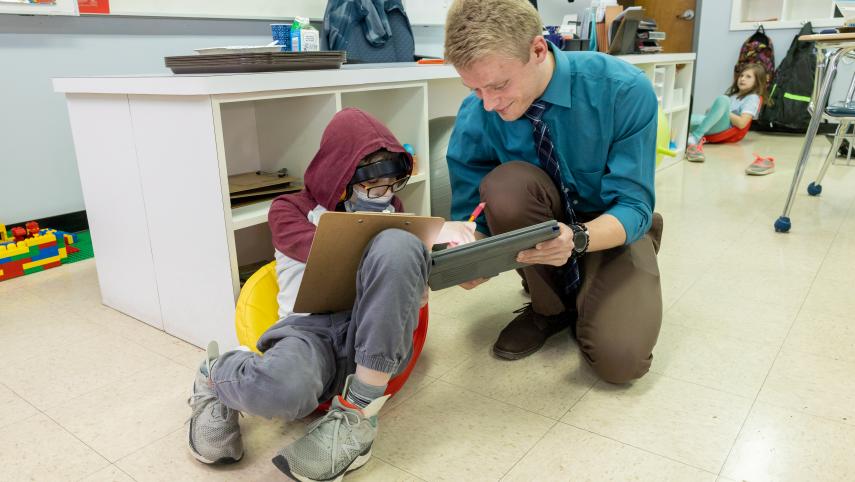Social, Emotional, and Behavioral Wellness Certificate

Quick Facts
-
PDE Endorsement Eligibility: This program meets the educational requirements for the Pennsylvania Department of Education (PDE) Social, Emotional, and Behavioral Wellness PreK-12 Endorsement. You must have a Level I or Level II certificate to add this endorsement; this includes Instructional, Educational Specialist, Supervisory, Administrative, and Vocational Instructional certificates.
-
Application requirements: Online application, transcripts, undergraduate GPA of 3.0 or higher or a GPA of 3.0 or higher for a minimum of 12 graduate credits at another accredited institution.
-
Deadline(s): April 15 deadline for summer start, July 15 for fall start, December 15 for spring start. The application and all supporting materials are due by the listed deadlines.
-
Course Requirements: 4 courses (12 credits)
-
Typical Course Load: Typical course load varies based on student needs and preferences. Courses are offered spring, summer and fall.
-
Time to Completion: Time to completion varies based on student needs and preferences.
-
Format: This certificate program may be completed entirely online depending on the courses selected.
Note: If you are not a US Citizen, please contact coe-admissions@lehigh.edu to confirm eligibility to apply to this program.
Overview
The SEBW Certificate Program is a 4-course, 12-credit program that has been designed to train both pre-service and in-service educators in meeting the social-emotional and mental health and needs of all students. In addition to providing educators with knowledge in promoting mental health wellness for all students, the SEBW Certificate Program will train educators in the supplementary and intensive services that go beyond universal prevention and intervention approaches to meet the full continuum of student need. The program has been designed to be relevant to an interdisciplinary group of pre-service and in-service educators, including teachers, special education teachers, school counselors, school psychologists, and school administrators and meets the educational requirements for the Pennsylvania Department of Education (PDE) Social, Emotional, and Behavioral Wellness PreK-12 Endorsement.
Course Requirements
The SEBW Certificate Program provides training on supporting the social, emotional, and behavioral wellbeing of all pre-K to 12 students through flexible graduate training experiences. Courses are offered fall, spring and summer and may be online or in-person based on course selections. Some courses require field experiences that can be met in a number of ways. The program has been designed so that both pre-service and in-service educators across a range of educational fields can select a pathway through the program. Students are encouraged to select the pathway that best meets their professional needs.
This flowchart illustrates the possible paths that may be taken in the SEBW program, depending on the professional needs of each student. A matrix of competencies has been developed for each program pathway to show how the full set of competencies is met in each.
Please view the Advisement Sheet to help you select your 12 credits!
Curriculum
EDUC 456: Trauma and Resilience in the Schools (3 credits)
This course is designed to provide educators and behavioral health trainees with a comprehensive understanding of risk and resilience as it relates to social, emotional, and behavioral wellness, broadly, and trauma, specifically. Course activities will facilitate students’ understanding of trauma, its components, and its effects on individuals and systems. A primary course focus will be on developing systems to effectually prevent and respond to trauma (a) within the Whole School, Whole Community, Whole Child (WSCC) model and (b) within a multi-tiered systems of support (MTSS) framework. A secondary course focus will be on the advancement of trauma-preventive and -responsive schools in the service of social justice and equity.
CPSY 456: School Counseling II: Trauma and Resilience in the Schools (3 credits)
This course is designed to provide educators and mental health trainees with a comprehensive exploration of the psychological trauma and resilience; including the history and current theories in the field, the nature of trauma (e.g., sexual abuse, combat, natural disasters); how trauma and loss affects individuals and systems, grief reactions, learning and behavior and traumatic stress; and the development of trauma-responsive schools. Because working with these topics can be emotionally taxing for helping professionals and educators, an added focus will be on vicarious victimization and self-care. Cultural-sensitivity, survivor-centeredness, and social justice efforts are emphasized within a trauma-informed care approach to prevention and practice.
EDUC 406: Social Emotional Learning in Context (3 credits)
This course takes students from a beginning understanding of social and emotional learning (SEL) and its relevance for educators to an understanding of practices that can be used in schools to promote resilience, wellness, and positive developmental outcomes for all students. Students will examine how the research grounded in different theoretical traditions frames social and emotional wellness and will evaluate whether the practices identified in research can address the needs of specific student populations.
SPED 432: Positive Behavior Support (3 credits)
This course focuses on the design of comprehensive, multi-component, functional assessment-based behavior support plans for individuals with a variety of disabilities who engage in problem behavior. Topics include functional assessment, antecedent and setting event interventions, replacement behaviors, consequence and crisis procedures, lifestyle interventions, and teaming strategies. Assessment focuses on the link between curriculum, academic performance, and behavior problems. The course promotes consideration of diverse populations for understanding behavioral differences. In addition, different strategies for ongoing monitoring and maintenance of behavior reductions are described.
EDUC 431: Multi-Tiered Systems of Social-Emotional Support (3 credits)
Training in multi-tiered systems of support (MTSS) to address emotional, social, and well-being of all students. Topics include the rationale for MTSS; Tier 1 evidence-based programs; targeted interventions, at the Tier 2 and 3 levels, to address the continuum of students’ behavioral needs; and an overview of the common mental health concerns that PreK-12 students experience. School personnel will learn how to integrate and apply the DSM-5 and IDEA to inform educational and mental health decisions within an MTSS framework.
CPSY/SCHP 407: Crisis Management in the Schools (3 credits)
This course is designed to introduce students to a three-stage model of crisis intervention in school settings, focusing on prevention, intervention, and follow up (primary, secondary, tertiary crisis intervention). Students will learn overriding prevention strategies including ways to prevent and prepare for crises, promote school safety, and to promote nurturing school environments and resilience. Students will also learn crisis response methods including methods of individual and group crisis counseling, as well as organizational consultation skills. Specific crises that will be focused on will include suicide, death of a student or teacher in school, and school violence. In addition, students will work together to develop a crisis intervention plan for use in a school setting.
EDUC 434: Prevention and Management of Crisis (1 credit)
This course is designed to introduce students to crisis response in school settings, focusing on best prevention, intervention, and follow up practices. Students will learn prevention strategies, such as ways to prevent and prepare for crisis, promote school safety and a nurturing school environment. Students will also discuss the considerations in building a crisis response team and will learn crisis response methods, including methods of individual and group crisis counseling. Specific crises that will be focused on include suicide, death of teacher, student, parent, or community member, and school violence.
EDUC 435: Leading Student Centered Schools (1 credit)
This module is designed to develop students’ knowledge about how to organize and implement initiatives that support a student’s social, emotional, and behavioral wellness. With an emphasis on implementation and operation, students will focus on inter-system collaboration among community partners to address student social, emotional, and behavioral needs through the implementation of equitable SEL programs and practices. Finally, students will discuss the protections associated with confidentiality.
EDUC 436: Social Emotional Learning in Action (1 credit)
The purpose of this course is for pre-service and in-service educators to learn more about the basic tenets of organizational change and implementation science; to better understand the process of engaging stakeholders; and to provide an opportunity to practice the application of SEL concepts. This course will focus on implementation of SEL initiatives within a system. In this course, students will develop an implementation plan for their school, classroom, or district (depending on their role at the school). Students will lay out a timeline, troubleshoot their planning with the instructor and other students, and present their plan to peers. The course will culminate with a developed plan for implementation that students can bring back to their sites.
